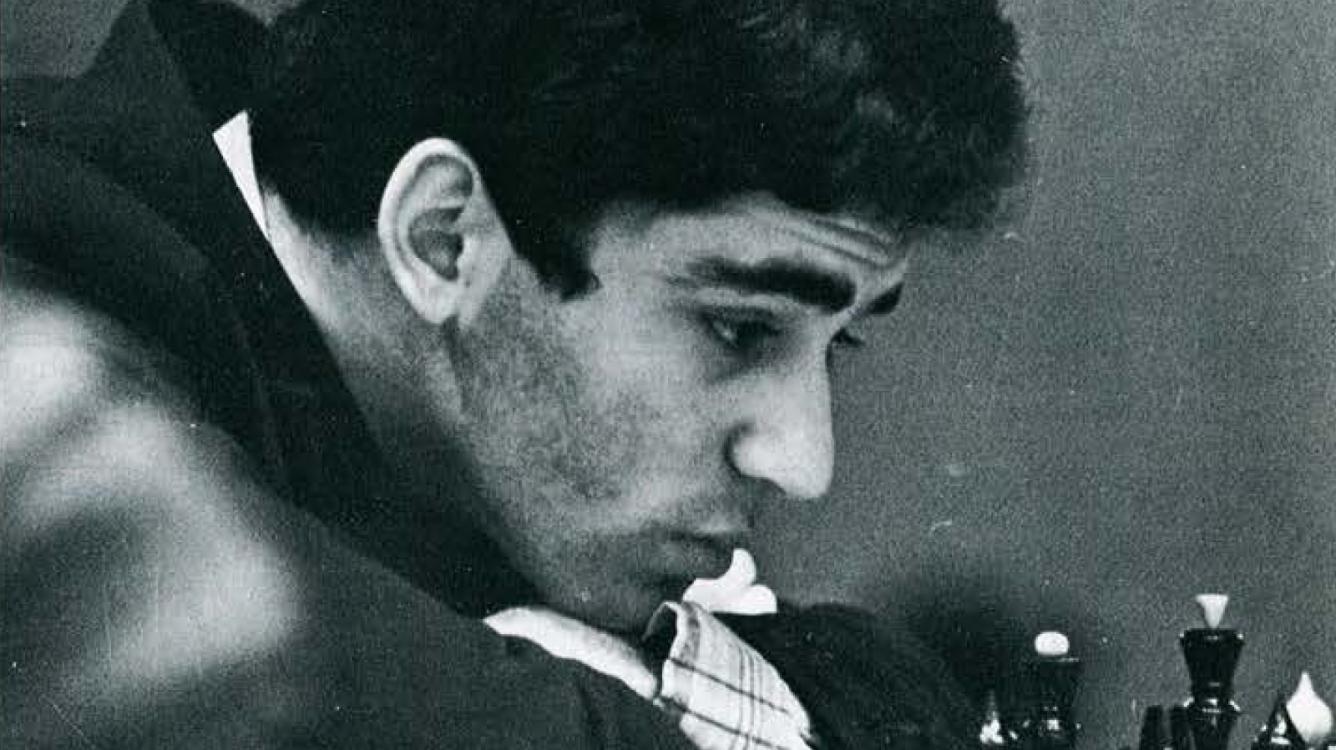
An early Garry Kasparov... Dortmund 1980
I was browsing through chess magazines online and tracked an article in Tidskrift för Schack [10/1980] on young then Kasparov. He had just won, at the age of 17, the 19th World Junior Chess Championship, held in Dortmund during Aug 1980. Second had come 15-year old Nigel Short. While Ivan Morovic-Fernandez had finished third.
Liked the article. It was picturesque, giving images of the early Kasparov. His studies & life, some aspect of his relationship with Botvinnik [a translation try via google in the end of this blog]. And as it would be expected I've looked at the games of this championship. I've found some beautiful [& maybe basic] patterns....
First a Kasparov's brilliancy
_
And a great attacking plan by Kasparov, possibly forcing defeat or draw
_

A risky choice by Short vs Morovic-Fernandez that could lead to defeat.
_
Short chose an adventurous opening line and against Akesson, who responded great, reminding older opening choices. Though in the end Akesson should had taken some precaution, so to retain the positional advantage. Of the most fascinating games of this championship
_
The previous game was played on rd 10. Akesson could have won, if he had played less dangerously. I couldn't help but compare it with the following game of rd 5, where he could have won earlier if he had chosen on the contrary a more risky plan. A thought on chess psychology occurred, but possibly I'm wrong. In any case it was a beautiful game...
_

And two beautiful tactics....
_

google translation of the above article a little modified after OCR
" Kasparov as Aljechin himself
- His nervous system works so fast and has such a memory volume that you are struck by amazement. He counts in-depth variations and finds surprising moves ... His combination view makes him akin to Aljechin himself ...
The one who speaks so commendably about 17-year-old Grand Master Garri Kasparov is no less than Michail Botvinnik. The praise may seem exaggerated, but the world champion knows what he is talking about. First, he knows Kasparov as a chess player better than anyone else: Garri still attends the sports club Trud's chess school, which is led by Botvinnik. Second, Garri himself can attest that no one criticizes him more severely than Botvinnik. 'Where others praise one till gets dizzy in the head, Botvinnik can also subject won games into hard but impeccable analysis. It seems like a cold shower ...'
Kasparov, who according to many experts already belongs to the top five-six in the world, has probably earned Botvinnik's praise!
Although Kasparov is still 'just the child', the chess world had already the time to get used to wins. In Dortmund he went undefeated through the tournament. After the final round, he had a phone call with his mother back home in Baku and admitted that he had more fun than strain during the second half of the tournament: the others had to play for second place. "Garri, you haven't gone crazy yet," asked mother Klara worried. "No, my little Mom, I'm just extremely objective," objected Garri, who sometimes comes too late to the games just because he has not been able to learn to shave quickly ...
It is possible that Kasparov just wanted to reassure them at home that he had not been overworked. He was more self-critical when he talked to us about the World Cup in Dortmund. Among other things, he did not conceal that he was physically very tired: 'The play schedule was very tough - a game every day. I didn't even get to see Dortmund, even though I love getting to know new places. A thank you to the organizers who after the tournament gave us the chance to recapture what we missed - they arranged a small tour through the Federal Republic. "
Kasparov came to Dortmund as a college student. He passed the ten-year school with a gold medal - fives in all subjects! - something that gave him the right to enter college with only one entrance exam - the special subject. Garri, who has always loved history, chose after mature consideration language college in Baku. On July 14 ("the day the Bastille was stormed" he pointed out, of course), he got special permission to take tests in English and did well, and then it was time to go for training for Dortmund.
But history then? 'Well', Garri said with a smile, 'in England the world's first chess club was founded. I can now study its history in its original language ...'
This junior, who, as many chess experts tip, has a chance to join in the fight for the 'real' world championship title, is lively, happy and sociable by nature. He loves to read. He also does this during tournaments - though now with caution: he remembers how during a tournament game he suddenly came to mind that the 'Count of Monte-Christo' was waiting in the hotel room. Garri made some hasty moves and ruined a good position. 'Books are overall my great interest', he says. 'Who do I like best? Lermontov, his 'Demon'. I have loved it since I was a child. Now I swallow Feuchtwanger, book after book - he is fantastic. And so Yevchenko.'
Garri also likes to go to the theater and misses no premiere at the Baku City Theater. But he is quick in his judgments and youthful categorical, and sometimes he comes up with annihilating 'reviews' in the style of: 'The whole piece is written so that the main character can say twenty words at the end!' Or even shorter: 'What a mess'.
Garri Kasparov does not correspond to the well-known and, it must be said, outdated image of chess prodigy, such as skinny, quiet, glasses wearing children, who do not know what physical activity is. Garri is almost athletically built with his 174 cm, starts the day with a cool jogging[?], is a good football player and likes all sports. After the college exam, he traveled to the Moscow Olympics and did not miss a day of athletics. He also saw the boat racings.
Simultaneous games and lectures for the most diverse audiences - school children, students, industrial workers - are often on Garri's program. From chess organizers in Azerbaijan, who previously only had a single international grand master, Vladimir Bagirov, we were told that the republic is now experiencing a real chess rise: Kasparov's example is contagious. New chess schools and chess clubs are founded, and schoolchildren just flow there.
It was no coincidence that Botvinnik compared Kasparov with Aljechin: he is Garri's great ideal. By the way, he himself says that it was precisely Botvinnik who 'made me persisted that Aljechin's way of playing chess was my way'. Garri tries to play, just like Aljechin.
Finally, we asked Garri the 'traditional' question:
- What is the chess game for you: science, art or sports?
- It is both sport - ie goals, struggle and victory - and art, came the answer quickly. Maybe it's science too, but it's a connecting component.
He is able to think independently, the 17-year-old chess hero. And otherwise he would never have become a Grand Master.
Vitalij Melik-Karamov, Alexej Srebnitskij/APN "
_
....thanx for reading
